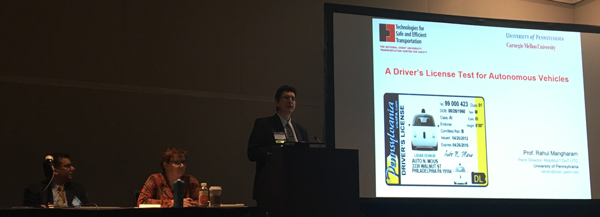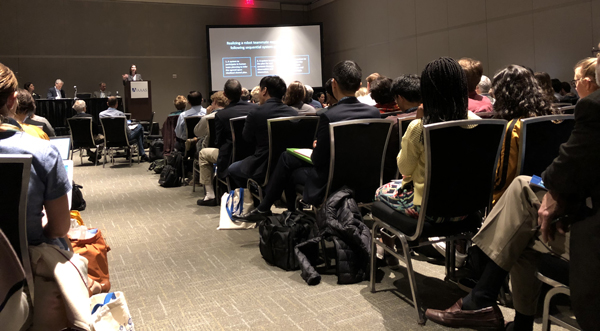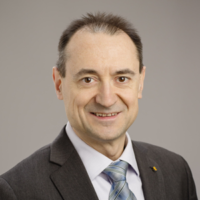CCC @ AAAS 2018 Recap
 Over the past few years, computing has had more of a presence at the American Association for the Advancement of Science (AAAS) Annual Meeting. This year’s meeting in Austin, TX had a number of computing talks and presentations, including three by the Computing Community Consortium (CCC):
Over the past few years, computing has had more of a presence at the American Association for the Advancement of Science (AAAS) Annual Meeting. This year’s meeting in Austin, TX had a number of computing talks and presentations, including three by the Computing Community Consortium (CCC):
Rethinking Approaches to Disaster Management and Public Safety with Intelligent Infrastructure, was moderated by CCC Executive Council Member Dan Lopresti, with speakers Michael Dunaway (University of Louisiana, Lafayette), Robin Murphy (Texas A&M University), and Nalini Venkatasubramanian (University of California, Irvine). They talked about the design and integration of intelligent infrastructure — including embedded sensors, the Internet of Things, advanced wireless information technologies, real-time data capture and analysis, and machine-learning-based decision support — which holds the potential to greatly enhance public safety, emergency management, disaster recovery, and overall community resilience, while addressing new and emerging threats to public safety and security.
Transforming Cities, Transportation, and Agriculture with Intelligent Infrastructure, was moderated by CCC Chair Beth Mynatt, with speakers George Pappas (University of Pennsylvania), and Shashi Shekhar (University of Minnesota, Minneapolis). This session discussed three critical areas of fundamental scientific research in intelligent infrastructure (cities, transportation, and agriculture), and the challenges and barriers to realizing these advances as part of economically sustainable systems.
 Artificial Intelligence: Augmenting Not Replacing People was moderated by CCC Director Ann Drobnis, with speakers Greg Hager (Johns Hopkins University), Eric Horvitz (Microsoft Research), and Julie Shah (Massachusetts Institute of Technology). Each talk highlighted a particular focus or application and illustrated both the opportunity for human augmentation, as well as the human-machine technology frontiers. The panel closed with a discussion of the opportunities and challenges of AI technologies for human augmentation.
Artificial Intelligence: Augmenting Not Replacing People was moderated by CCC Director Ann Drobnis, with speakers Greg Hager (Johns Hopkins University), Eric Horvitz (Microsoft Research), and Julie Shah (Massachusetts Institute of Technology). Each talk highlighted a particular focus or application and illustrated both the opportunity for human augmentation, as well as the human-machine technology frontiers. The panel closed with a discussion of the opportunities and challenges of AI technologies for human augmentation.
Based on the engagement of the audience in all three sessions, it is clear that there is an excitement in the broader research community for this work. We hope that computer science sessions continue to grow at future AAAS meetings.
In addition to the three sessions, Andrew Bernat, the Executive Director of Computing Research Association (CRA), CCC’s parent organization, was made an AAAS Fellow. Congrats to Andy!
The CCC will be blogging about each individual session over the next few weeks. For more information about CCC’s involvement in AAAS, please see this website.








